CCT and CCYA spotlight nine inspiring young alumni.
Columbia College | Columbia University in the City of New York
CCT and CCYA spotlight nine inspiring young alumni.
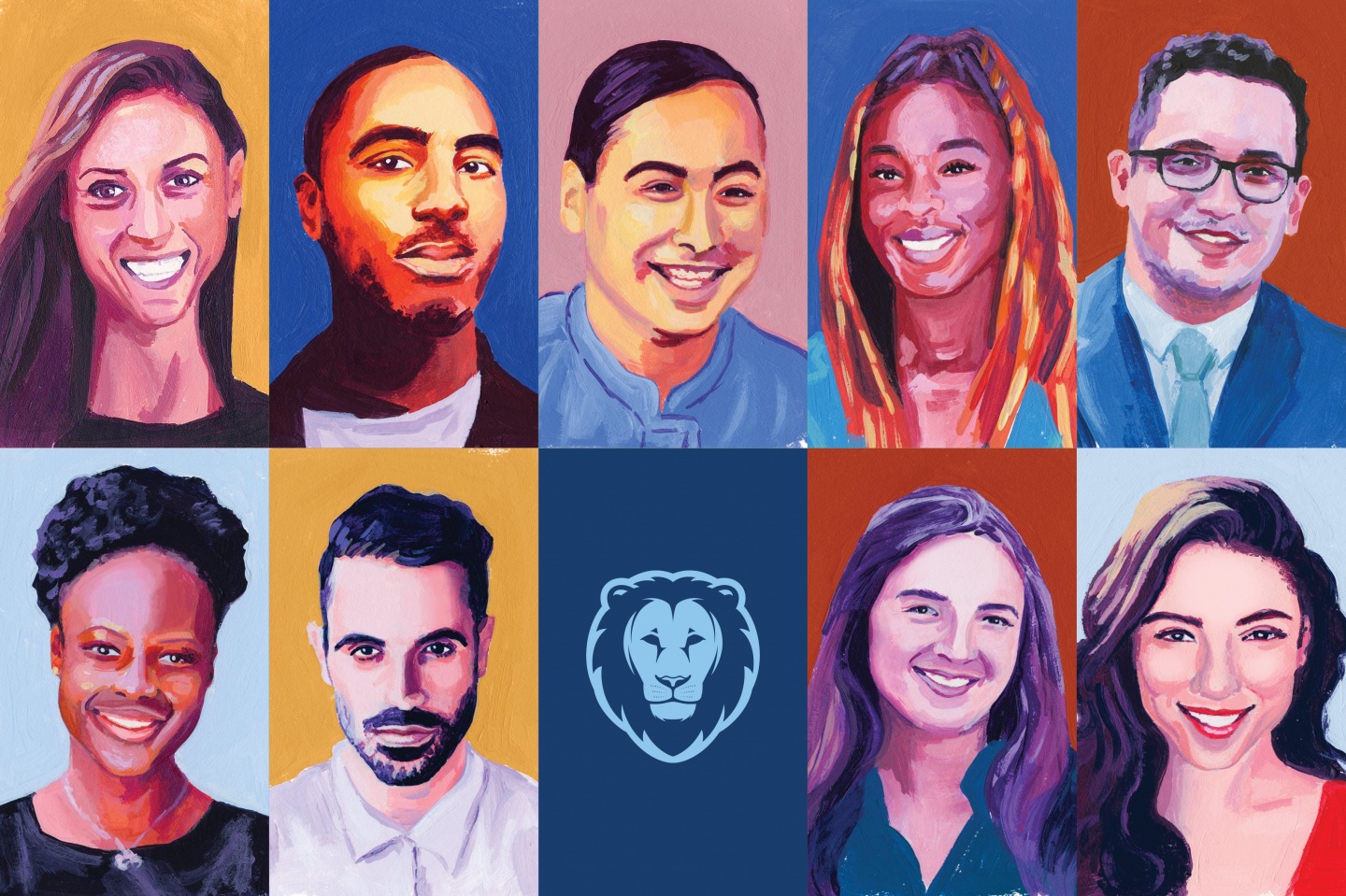
Welcome to the second installment of Lion’s Pride, a celebration of outstanding alumni from the last decade. With thanks to Columbia College Young Alumni for its partnership in soliciting nominations, we’re excited to introduce our nine honorees — a cohort with a distinct bent toward engaging with the pressing issues of our time: social, political, environmental, cultural. These Columbians are creating space for and provoking necessary conversations; working toward solutions in their respective spheres; reshaping perceptions; and using their creativity to empower themselves and others. Notably, many of them have made their own opportunities. And they all push themselves for what they believe in. At a time when it often seems there’s a lot in the world that needs changing, we’re glad to have them on the case.
— The Editors
Interviews and Text by Nathalie Alonso ’08, Alexis Boncy SOA’11 and Jill C. Shomer;
Illustrations by Alyssa Carvara

What does a professional athlete do with no events to compete in?
Triathlete Isabel King ’13 found herself contemplating that question in March 2020, only a few months after shelving a newly earned M.B.A. to take a chance on her dream of pro cycling. The timing was unfortunate, and though King could still safely train, she wasn’t content to leave it at that. “‘There’s got to be something more that I can do,’” she recalls thinking.
That something turned out to be Mountains for Medics, a fundraiser to help the healthcare workers who were manning the Covid-19 front lines. The California-based King pledged to ride a grueling 112 miles and climb 12,000 vertical ft., each day for three consecutive days, through her “backyard” in the Santa Monica and Malibu mountains. “I wanted to emulate the three-day, 12-hour shifts that the frontline workers were doing,” she says. The ride raised more than $20,000 for the UCLA Patient Care and Healthcare Provider Protection Fund.
King’s philanthropy didn’t end there. After the ride she joined one of her training partners, former Indiana Pacers shooting guard Reggie Miller, to design a “Say Their Names” bike jersey as a fundraiser for the Equal Justice Initiative. Their project, in connection with sports retailer Castelli, raised more than $70,000 and was the best-selling jersey in the company’s history.
King’s journey to becoming a pro cyclist was, by her own admission, “nonlogical and nonlinear.” A co-captain of the Columbia soccer team, she graduated with a psychology major yet pursued a career in finance. After four years on the trading floor at UBS, she enrolled in business school at UCLA Anderson, and also discovered a love for triathlons. She decided to balance the two, attending classes while training 20 hours a week. She qualified to compete as a professional triathlete in her fourth Half-Ironman race in 2019.
In 2020 King switched her focus from triathlons to off-road mountain bike and gravel riding. She’s a “privateer,” meaning that rather than being part of a sponsored road cycling team, King is her own boss: “I treat myself as my own business entity. I layer together sponsors that I believe fit with my brand and that I want to represent. I get to choose the races that I want to go to.”
Last year, as pandemic restrictions eased, King traveled throughout the United States to compete. Asked what the off-road experience is like, she points to a race called “Unbound Gravel,” in Emporia, Kans. — “200 miles of farm roads, stopping every four or five hours to refuel with food and water. You’re literally in the middle of nowhere, following a little bike computer telling you where to go. It’s wild.”
Asked what’s next, King references her father. “My dad had a saying: ‘Keep your knees bent.’ It came from skiing moguls — sometimes you’re not going to see the bump in the road, but if your knees are bent you can absorb the bump and continue down the mountain. So, I’m just going to keep my knees bent, say ‘yes’ to opportunities and see where I can go.”

Coleman Hughes ’20 isn’t your average up-and-coming podcaster.
Two years into his wide-ranging interview show, Conversations with Coleman, he’s already hosted figures like renowned intellectual Noam Chomsky, astrophysicist Neil deGrasse Tyson GSAS’92, and journalists Megyn Kelly and Ezra Klein. In fact, the podcast life is going so well that last spring Hughes stepped away from his roles as a fellow with the conservative Manhattan Institute for Policy Research and a contributing editor to its magazine, City Journal, to devote himself entirely to his audio venture.
Hughes, who has been a guest on podcasts such as Making Sense with Sam Harris, as well as on TV’s Real Time with Bill Maher, attributes his show’s growth to his penchant for asking questions that go beyond the surface of his guests’ expertise. “I feel like I’ve succeeded when my guest tells me, ‘This was a more-interesting-than-average interview,’” says Hughes. “I hope that’s one thing that’s appealing about my podcast to them.”
Hughes describes his podcast as a “platform that champions free speech, free thought and open debate.” In that spirit, he tackles an array of issues, including race, science and culture. As an independent podcaster, Hughes relishes the autonomy that comes with choosing guests and discussion topics. “I don’t have to restrict myself,” he says.
Outside the studio, Hughes’s commentary on social issues has appeared in The New York Times and The Washington Post, and in the online magazine Quillette, among other publications. He was still in college when Post columnist Megan McArdle called him a “thinker to be reckoned with.” And his impressive trajectory landed him on Forbes’s 2021 “30 Under 30” list in the media category.
Hughes’s current path is vastly different from the one he envisioned when he enrolled at Juilliard after high school. The New Jersey native was studying to be a jazz musician when his mother passed away unexpectedly. The loss left Hughes pondering the meaning of life and “what the point of it all is” — questions that prompted him to apply to the College. He studied philosophy, a background that has become the foundation of Conversations with Coleman. “It gets you down to first principles, which is a very good thing as an interviewer,” Hughes says of his major.
Hughes says he has found that the solitary nature of listening to podcasts encourages him to question his beliefs, and hopes that his show will have the same effect on listeners. “That experience is really profound,” he says. “I want to give that to people because I’ve found it so valuable in my own life.”

To describe analyst, advocate and writer Julian Brave NoiseCat ’15 as “prolific” hardly does justice to the volume of his work on Indigenous rights and climate justice. But it’s the substance of that work — coupled with the authority of his experience as an Indigenous person — that earned him a spot on this year’s “TIME 100 Next” list of emerging leaders.
NoiseCat is VP of policy and strategy at Data for Progress, a think tank that supports progressive causes through polling and policy development, and which has become influential among the highest ranks of the Democratic party. Much of his work in that role has been in the service of climate platforms like the Green New Deal, a focus he says stems naturally from his heritage as a member of the Secwepemc First Nation and a descendant of the Líl’wat Nation of Mount Currie of British Columbia. “Indigenous peoples, by definition, have a deep history with a place and the land and water where they come from,” NoiseCat says.
As an activist, NoiseCat has been heavily involved in grassroots campaigns in support of Indigenous peoples. At Columbia, he played a key role in the creation of Manhattan House, a residential special interest community for Indigenous students. And in 2019, he helped organize a high-profile canoe journey in San Francisco Bay that brought together Indigenous communities from as far west as Hawaii. The event commemorated the 50th anniversary of the 1969 Alcatraz Occupation, a 19-month long intertribal protest that drew attention to the land rights concerns of Native Americans in the United States. “That movement was incredibly impactful in the United States and in broader Indigenous history, but it remains, I think, unrecognized and uncelebrated,” says NoiseCat, who was born and raised in Oakland, Calif. “We wanted to continue the spirit of that movement.”
NoiseCat’s extensive reporting and commentary has appeared in The New York Times, The Washington Post, National Geographic and The Atlantic, among other publications. He is also a columnist for Canada’s National Observer and a contributing editor to Canadian Geographic, and is working on a forthcoming book that will combine narratives of his life as a contemporary Indigenous man with reporting on Native communities in the U.S. and Canada.
NoiseCat is staunch in his commitment to continue bringing Native issues and perspectives to the fore. “Our continued presence as self-determining Indigenous peoples with distinct cultures, languages and social movements should matter to more people than just ourselves,” he says. “That’s the idea I’ve committed my life to.”
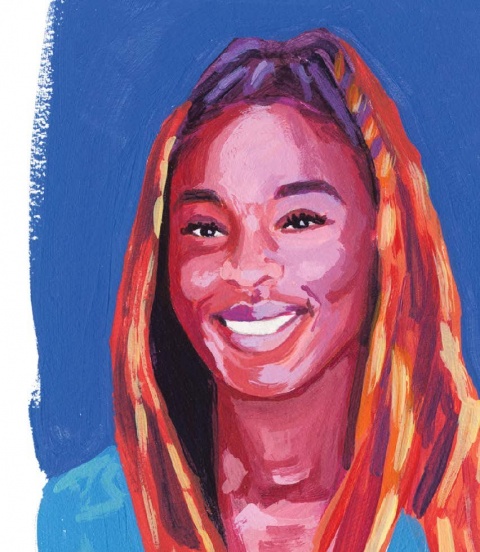
How does a premier athlete move forward when their sport is no longer their primary focus? That’s the question Olympian Nadia Eke ’15 — a Ghanian triple jumper who hung up her sneakers after Tokyo last summer — wants to help others answer as the CEO of the startup Axxelerate.
Eke co-founded Axxelerate in 2020 with Marquel Carter ’14 (a former Lions defensive back) and Aniekeme Umoh SEAS’15. The company is developing educational programming and networking opportunities to help athletes discover what they want from their post-athletic careers and to build personal brands that will allow them to find new meaningful employment. Eke’s ultimate goal is to empower athletes to “recognize that ‘this is the story that I have to tell beyond the sport, and these are the opportunities I can center around that,’” she says.
It has long been Eke’s ambition to “build something to help athletes,” and Axxelerate is allowing her to leverage her industry connections and insight to do just that. Too often, Eke says, professional athletes are unequipped to transition into the corporate world. “I’m supporting athletes like I always wanted to, but in a unique way that no one else is doing,” she says.
Eke certainly knows whereof she speaks, coming off a track and field career in which she became one of the world’s top female triple jumpers. She has three IAAF African Athletics Continental medals and in 2019 set the Ghanaian national record in the triple jump — a performance that qualified her for the Olympics. Having already decided to retire from competition after Tokyo, Eke soaked in every moment of the Olympic experience. “Mentally and emotionally, I was ready to walk away from the sport, and to walk away at the highest stage,” she says.
A four-time NCAA All-American in track and field and Ivy League nominee for the 2015 NCAA Woman of the Year, Eke also had the honor of being the flag bearer for Team Ghana at the Tokyo games. (She and sprinter Yasmeen Al Dabbagh ’19 of Saudi Arabia became the first female Olympic flagbearers in Columbia history.) “To be the flag bearer, for me, was a testament to the value of investing in sports and investing in women,” says Eke.
Yet even while rising to the pinnacle of her sport, Eke has always seen herself — and wants others to see her — as more than an athlete. It’s why she chose to pursue an Ivy League education. And it is the central tenet of Axxelerate. “You never stop being an athlete and start living your life,” says Eke. “We are all multifaceted people.”
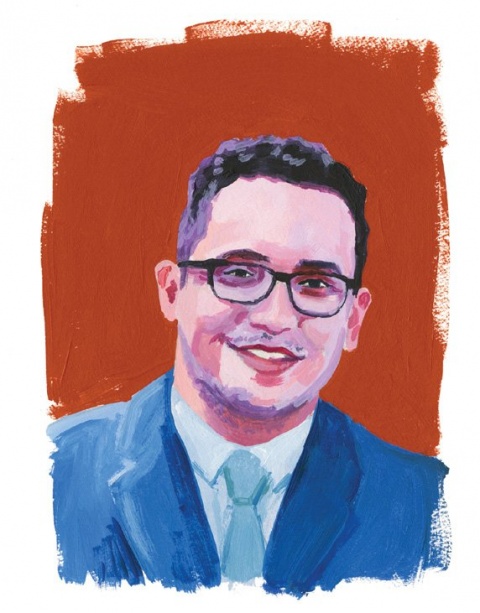
For Shaun Abreu ’14, public service is a deeply personal endeavor.
When Abreu was just 9, he and his family were evicted from their Washington Heights apartment. He stayed first with neighbors, and later with his nearby grandmother, before moving to the Bronx. Once his parents got back on their feet, they found a place on the Upper West Side. Now, as an attorney specializing in tenants’ rights and a recently elected New York City Council member, Abreu is looking out for a constituency with whom he has a long-held connection. His district — District 7 — includes his childhood home, and is in fact where he’s lived and gone to school most of his life.
“You grow up in a neighborhood where they see you going through the worst,” Abreu says. “And now in many ways the roles are reversed, and that’s what community is about — having each other’s backs.” He notes the diverse backgrounds and needs of the residents in his district, a long, narrow stretch of the West Side that also includes Hamilton Heights, Manhattanville, West Harlem, Morningside Heights and Manhattan Valley. “It’s an honor for me to be in a position to have my community’s back, to make sure we’re pushing for policies that are going to improve lives.”
While in high school, Abreu worked at the Morningside Heights branch of the New York Public Library, on Broadway at 113th Street. “Every day I would pass the University, and it would seem both so far away and so close,” he recalls. The future political science major became a student at Columbia’s Double Discovery Center and participated in its Freedom and Citizenship program, which included a college-level seminar in political philosophy. Abreu credits those experiences, and especially the Core Curriculum, with “rewiring” his thinking. “It opened my eyes to the social contract and the obligations we all have to each other, and forced me to think about what role I play in a civil society. What do I want to do, and how can I make my community better?”
Abreu’s first and only significant departure from NYC was for law school at Tulane; he graduated in 2018 and the following year began working for the nonprofit New York Legal Assistance Group. He stepped down to join the City Council but notes his experience will help with drafting legislation, and in particular his goal to build on a law that guarantees housing court counsel for low-income tenants facing eviction.
Looking ahead, Abreu hopes for reelection but isn’t one to speculate further. “I’m focused on my constituents and doing right by them,” he says. “And that’s what it comes down to: Focus on the work and you have a bright future.”
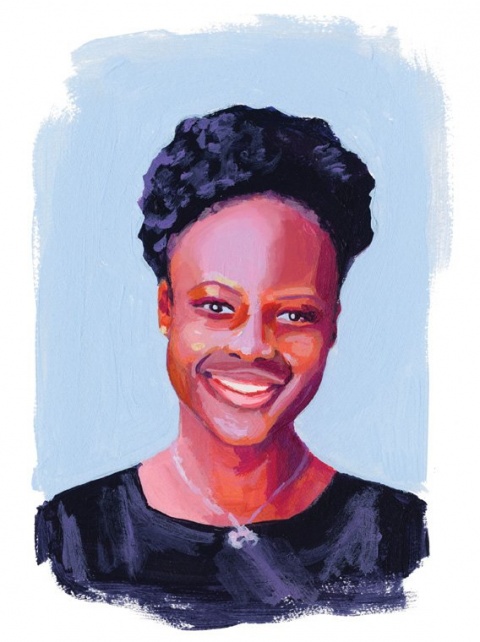
Bianca Joseph ’18 is resolute about the need to dismantle the school-to-prison pipeline, the shorthand term for the national trend of calling on law enforcement to handle in-school student misbehavior or rule breaking, even for minor offenses.
It’s a battle she’s waging on two fronts — as a social worker at a Houston public school that primarily serves economically disadvantaged students of color (the population most often ensnared by the school-to-prison pipeline) and as the founder of Youth Empowerment Through Social Support, a nonprofit that aims to enrich the minds and lives of minority youth through programs that nurture their social and physical environments.
“[These students] are punished more easily,” says Joseph, who majored in psychology at the College and earned a master’s in social work from Penn. “Their struggles in life are dismissed and they are criminalized from an early age.”
Joseph’s career path was informed by her experience with the school system in her hometown of Riviera Beach, Fla.: She felt that as a high-achieving student and athlete, she often received more support from teachers and staff than her struggling peers.
As a social worker, Joseph is “adamant about making sure that I’m a kid’s first stop instead of the police.” She counsels students in grades 6–12 to address anxiety, grief, depression and other mental health concerns so that they can “be present” and focus on school. “I can get them resources and address their mental health and emotional needs. That way they don’t come into contact with the prison system,” she says. (Such interventions are sorely needed: According to a 2019 ACLU report, 14 million students in the United States attend schools where there is a police presence, but no counselor, nurse, psychologist or social worker.)
Joseph’s nonprofit takes a different approach to interrupting the pipeline, by helping high school students of color get into college through its flagship program, the College Admission Network. Joseph launched CAN while attending Penn; to date, it has paired more than 60 high school seniors at three Philadelphia schools with local undergraduates who help them complete their applications and write essays.
Joseph started the program because, while she was recruited by Columbia for track and field, she saw many of her classmates overwhelmed by college applications. “If more students feel supported in applying to college, they are more likely to want to go,” she says.
All of the students in the program have been offered admission to at least one college or university, notes Joseph. She hopes eventually to expand CAN to high-need schools in other cities. The program is “self-sustaining,” because students who graduate and enroll in college then become advisors for the next cohort. “The idea is that it will be for the community and by the community,” Joseph says.

Bulgarian director, choreographer, dancer and writer Kosta Karakashyan ’19 is using his art to fight for LGBTQ+ equality.
As the founding editor-in-chief of the website Out.bg, Karakashyan is creating positive media representation in one of the most homophobic countries in the European Union. He also recently founded his own production company, Studio Karakashyan, as a hub for his film and stage projects and to help launch other Bulgarian artists.
“We are doing a series of master classes and workshops to develop and empower young singers, dancers and actors, and help them create the career they want,” Karakashyan says.
His own career in the performing arts wasn’t the original plan. Though he had studied ballroom dancing from childhood, Karakashyan comes from a family of doctors and assumed he’d be pre-med. But after being accepted to the College, he was invited to appear as a professional dancer on the Vietnam version of Dancing with the Stars. “This whole world of entertainment opened up, so I took a gap year to really think about what I wanted to do,” Karakashyan says.
He eventually came to the United States and majored in dance through Barnard. The freedom he felt in New York City was revelatory. “I enjoyed how open Columbia and the city were, in terms of LGBTQ+ rights; it really gave me a space as a gay man to think about how free people can feel, as compared to my own country,” he says.
Karakashyan found a new avenue of expression through a class where students create dance films. He made the documentary Waiting for Color about the persecution of LGBTQ+ people in Chechnya; the film has appeared in more than 25 festivals. He later participated in the acclaimed 2020 documentary Welcome to Chechnya.
Karakashyan’s experiences inspired him to earn a master’s in human rights and democratization from the Global Campus of Human Rights in Venice, Italy. He then moved back to Bulgaria and launched Out.bg with the Single Step Foundation.
“I got to create the whole thing from the ground up,” he says. So far, response has been positive: Out.bg recently posted a well-received feature about a famous Bulgarian bodybuilder who had come out as a trans woman, portraying her in a feminine light for the first time. “We provide an alternative and respectful lens,” Karakashyan says.
And things are humming at Studio Karakashyan: He recently received funding for an immersive theater project that will open in May, and he’s in post-production on his next film, Surrender, about male dancers and masculinity.
Karakashyan admits it can be “complicated” being back in Bulgaria — “it’s exhausting, to always have to demand the same respect, on a personal and artistic level” — but it’s also inspiring him to create the kind of supportive and creative community he enjoyed at Columbia. “I’m interested in bringing together all the nuggets of wisdom I’ve learned in my work abroad to help people,” he says. “I’m trying to find a way to empower artists here.”
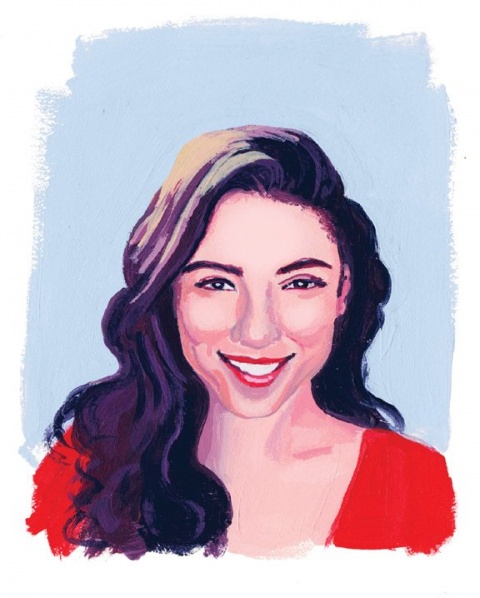
Nuyorican actress and filmmaker Dominique Nieves ’12 is determined to bring more authentic Latinx stories to the small screen. “Too often, stories representing marginalized people focus on trauma,” says Nieves. “We should have representation that reflects those challenges while still being joyful entertainment.”
Nieves’s conviction comes from experience. A former med student, while still in school she landed a string of acting gigs, including appearances on Inside Amy Schumer and Orange Is the New Black. But she quickly grew tired of being cast as the “sexy Latina sidekick.” So when health issues altered her plans to become a doctor, Nieves decided to create her own roles. Since founding Iron Glove Productions in 2017, her films have been selected by HBO’s NY Latino Film Festival and the Official Latino Film and Arts Festival in NYC, among many others.
Last year, Nieves got her first television writing and directing credit — and recognition as a BAFTA Breakthrough Director and Writer — for a story she contributed to the PBS Primetime Broadcast Special The LATINXPERIENCE. The film, Our Lady Lupe, aired in July. Set in NYC, it features a boy named Chico who meets a supernatural mechanic (Nieves) while trying to get his mother’s car fixed. The story draws from the mysticism that was part of Nieves’s upbringing in Brooklyn. “Our Lady Lupe started as my attempt to incorporate the magical stories I grew up hearing into my urban reality,” she says.
Nieves is also elevating other Latinx voices in the industry. In September 2020, during Hispanic Heritage Month, she launched a mentorship initiative for up-and-coming Latinx TV writers. Using the hashtag #ReadLatinxWriters on Twitter, Nieves issued a call for industry professionals — showrunners, agents, executives and the like — who were open to reading and commenting on scripts. Then she invited writers to apply for mentorships and paired about 200 writers with industry insiders. Her goal was two-fold: for the mentees to get feedback on their work and to help them forge connections.
Now in its second year, #ReadLatinxWriters is a response to the dearth of Latinx creatives in the entertainment industry: According to a 2020 report by the Writers Guild of America West, the union representing TV writers and screenwriters, just 8.7 percent of television writers identify as Latinx, even though this group is the largest minority in the United States.
Nieves hopes her efforts will lead to greater Latinx presence in TV writers’ rooms, and in turn help combat harmful stereotypes. “I really think that storytelling can help to increase empathy, specifically empathy for rarely told stories,” she says.

A passion for climate change — the defining issue of our time — led Arianna Menzelos ’21 directly from Morningside Heights to Pennsylvania Avenue.
After interning at the White House Council on Environmental Quality last spring, in August Menzelos assumed the role of special assistant to National Climate Advisor Gina McCarthy. As such, the recent College grad is in the thick of the action at the White House Office of Domestic Climate Policy, created by President Biden to oversee a government-wide response to the increasingly urgent climate crisis. It’s Menzelos’s job to ensure that her team of 20 is prepared for the day’s agenda, making her a key cog in the office’s operations. “I’ve had the privilege of engaging with people who are knowledgeable and passionate about climate work,” she says of her time on the job so far.
Menzelos, who majored in sustainable development, was on her high school’s sustainability council and knew early on that she wanted to focus on environmental issues. She was drawn to climate policy at the College when she “started taking classes that pointed me to the ways in which the climate crisis intersects with all other issues.” Menzelos points to “Climate Change Law and Policy,” taught by Michael Gerrard ’72, founder and director of Columbia’s Sabin Center for Climate Change Law, as one that continues to resonate. “It gave a really in-depth dive into the policy levers for combating climate change that I am able to see my team [at the White House] work on,” she says.
These days, Menzelos finds herself handling quite a few memos, a format she became familiar with during a sophomore year internship at the Sabin Center, where she conducted research on topics ranging from gas stove emissions in New York to the history of the Tennessee Valley Authority. Menzelos later interned at the New York State Energy Research and Development Authority and was a policy volunteer on Biden’s presidential campaign. And, as a junior fellow at the progressive think tank Data for Progress, she co-authored the Green Marshall Plan, a foreign policy strategy for developing and adopting clean technology.
Climate activism was also an important component of Menzelos’s time on campus: She was one of the leaders of Columbia for Carbon Neutrality, a student-led campaign to persuade the University to commit to becoming carbon neutral by 2030.
Menzelos won’t speculate where her career might take her, but says that her work in Washington, D.C., has already shown her that there’s more than one angle from which to tackle climate-related issues. “It’s just a fascinating scientific, political and economic problem,” Menzelos says.

Published three times a year by Columbia College for alumni, students, faculty, parents and friends.
Columbia Alumni Center
622 W. 113th St., MC 4530, 6th Fl.
New York, NY 10025
212-851-7852
cct@columbia.edu

Columbia Alumni Center
622 W. 113th St., MC 4530, 4th Fl.
New York, NY 10025
212-851-7488
ccalumni@columbia.edu